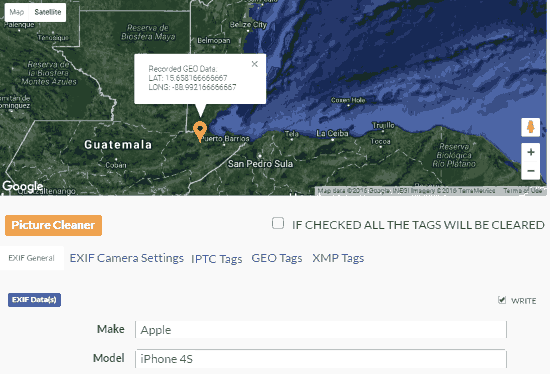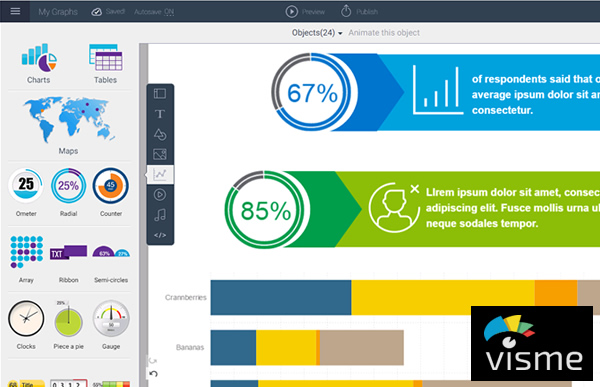Et voici déjà la nouvelle fournée.
Vous y trouverez des logiciels, services en ligne et extensions pour navigateurs regroupés sous le terme générique d’ « Outils » et des articles (universitaires, de journaux) et documents divers (présentations, tutoriels, vidéos…) sous le terme « Contenus ».
Vous pouvez retrouver ces découvertes « au fil de l’eau » sur mon compte Twitter ou sur mon profil Diigo (auquel vous pouvez vous abonner en créant votre propre compte ou en utilisant le flux RSS).
Et puis j’ai rajouté une catégorie musique. Parce que.
Bonne(s) lecture(s)/expérimentation(s)/écoute(s)
Outils
Mailytics : analyse de campagnes d’email marketing de la concurrence
Payant
Vigilante : notification de crimes en cours par une appli iOs (New York)
LargerIO – pour savoir quelles technos utilise un site web
Findo – Moteur de recherche pour les services en cloud
PDF Viewer for iOS & Android – Reading, Reviewing, Annotating
Huzzaz – service de curation de vidéos
Pas de possibilité de créer des groupes privés.
Frisechronos.fr : creer, imprimer, modifier et generer pdf, excel, openoffice
Générateur de frises
Office Timeline: extension PPT pour créer frises chrono et GANNT
Ingenta Open Home – nouveau portail de publications en open access
IDneuf – Portail d’accès aux ressources pédagogiques de l’AUF
The National Academies Press – base de données d’Open books scientifiques
Your Social Media Fingerprint – Sur quels médias sociaux êtes-vous connecté maintenant
Service qui vous indique sur quels médias sociaux vous êtes connecté en temps réel. Toujours impressionant!
Pocket’s Explore tab adds more reading suggestions
Free Online EXIF Metadata editor: the eXif.er

9 Great DataViz & Infographics Tools with Education Discounts

PomDoc. Travailler un texte à plusieurs mains
Une extension Chrome pour vérifier qu’une URL existe dans Reddit
Convertilla : un logiciel gratuit de conversion audio et vidéo
View EXIF Data of An Image By Hovering Mouse Cursor on It
Framanotes : un outil de prise de notes rien que pour vous !The IoT List – Annuaire de l’Internet Of Things

Contenu
La Gendarmerie expérimente une méthode d’analyse prédictive en matière de délinquance
How To Embed Subtitles Inside A Video
Veille d’image sur internet : enjeux, méthodes, limites
Article de recherche
Check Now If Your Internet Devices Are Open to Hackers
How the Very Best Strategists Decide
Article passionnant à plus d’un titre.
- In general, the more people who chose a strategy, the better the strategy performed. (The largest crowds, though, rated about average.)
- The simulations also showed that loner strategies usually performed below the crowds’ popular strategies.
- But the strategies that performed the very best were also loners.
- To do something the crowd isn’t doing, you must think something the crowd isn’t thinking. You can generate ideas by broadening your decision frame.
- No one proposes a strategy thinking it will fail, so you must be able to tell the difference between good and bad loner strategies. You can evaluate those ideas by embracing critical thinking.
- We narrow our decision-making frame when we believe we know what the future will look like
- We ask this illuminating question: “What could we do?”
- Imagine it’s the future and you’re saying “I wish we’d thought about X.” What is X?
- Ask what would be the equivalent in your industry of something that’s working well in another
- Ask what you’d do if you were entrepreneurs preparing to enter your market de novo
- Ask what you’re afraid your competitors might do
- Notice your favorite metaphor for business: chess, war, making deals, doing good, enriching shareholders, satisfying customers. Switch to another.
- Apply humor — it opens up the brain. In my workshops I ask people to create as many ideas as they can to prevent a bathtub from overflowing. My favorite: Call the water company and tell them you won’t pay your bill.
- Strategy development and internal reviews often focus on precedents, trends, and due diligence. They implicitly address “what will happen.”
- Role-play other parties. “If I were a key competitor or typical customer or government regulator…”
- Have people take turns as designated contrarians
- Listen for assumptions in the way a strategy is supposed to work, and question them as Murphy’s Law incarnate. What could go wrong? How badly will it hurt?
- Learn about and watch out for confirmation bias, overconfidence, survivor bias, and groupthink
- Forecast your competitors’ results as well as your own. What will they do if those forecasts come true?
- Beware of missing pieces in the tools you use. Financial analysis isn’t designed for nonfinancial factors such as competitive dynamics and customer loyalty. Extrapolating trend lines into the future assumes the future will look like the past.
What Do People, Not Techies, Not Companies, Think About Artificial Intelligence?
- In conclusion, consumers seem ready to accept AI, or at least are ready for what they think AI is right now. Perceptions are undoubtedly colored by stories in the media about robots, drones, gaming, and speech recognition. But many people appear willing to use AI to save time, complete dangerous tasks, and make their lives easier.
- More than 40% said they would trust AI to cook, teach, police, drive, and provide legal advice. On the other hand, using AI in child care ranked at the bottom of the list.
- Two-thirds or more said they would trust AI with handling medication reminders, travel directions, entertainment, targeted news, and manual labor and mechanics
- The vast majority of people (92%) told us that they expect AI to arrive eventually
- Only 8% of global respondents think AI is science fiction and will never materialize
- We found that by far the most common first impression of AI is “robots,” as 22% of respondents said.
- More consumers see AI’s impact on society as positive than negative (45% and 7%, respectively).
- Yes, consumers are worried about job loss, security issues, and privacy infringement. But, for the most part, consumers are accepting of AI
#MakeMeStats : avec le TrendsRating, analysez les comptes influents sur une tendance Twitter
L’attention, comment ça marche ? | Thot Cursus
Comment la technologie détourne notre attention
Competitive Monitoring: How to Build a Strategy in 4 Steps
5 New Social Platform Features You Need to Know About | Social Media Today
All the New Features in WhatsApp You Need to Know About
New Netvibes Potion Ingredient: Google Sheets | via @secou
Des outils pour construire des frises chronologiques
Google intensifies tracking: check your private settings
Google’s redefined privacy policy lets ads follow you everywhere
Wargames et stratégies de communication – Par S. Goria
Art. de recherche
Why wargaming works
Art. de recherche
10 Tools for In-Team Marketing Collaboration

L’analyse Win-Loss, outil d’intelligence stratégique et d’influence
Par Euresis
Are You Brainstorming the Right Way for Innovation?
Article très intéressant sur la manière dont doit se faire un brainstorming si l’on veut vraiment innover. Basé sur une étude autour des brevets.
- What is also necessary is in-depth expertise of the topic at hand. Those two factors together result in truly innovative ideas and also yield the highest economic value.
- Specifically, we found that different types of creativity contribute to the novelty in the knowledge space — how novel the idea is relative to the economic value that is created
- This relates to the idea of brainstorming. Everyone thinks we’re going to solve a creative problem by coming together and brainstorming.
- What this would say is brainstorming is not enough without the deep knowledge development that you would need in a particular domain to understand what the issues are so that you can break away from existing ways of thinking.
- And what’s interesting about that is that prior studies had always assumed that if you got a high level of citations it was because the idea was very novel. And so, they just said, “Because the idea’s novel, it gets more citations and therefore, it’s a breakthrough innovation
- What we found in our study is, in fact, that most of the patents that do get highly cited are not necessarily novel — truly novel from a language standpoint, from a knowledge standpoint — that is, they’re not breaking new ground in the knowledge space.
- by doing that, we’re able to then show that there are different creative processes that lead to novelty than those that lead to generating citations. That’s really the surprising part for me was finding out that the assumptions that the field had been making up until now about the direct connection between novelty and citations were not as neatly linked as people had assumed.
- So if we’re thinking about an R&D organization, that means really valuing the “R” part of R&D, the research part that says we’re going to really dive deeply into an area before we even know specifically what the product might be or the service might be because we have to understand an area deeply enough in order to be able to identify the key problems, challenges or anomalies in the field
- if you just go straight for combination and diverse teams, you may be missing out on the highest impact ideas because you haven’t done what I consider to be the pre-work, which allows you to have that in-depth insight into innovation.
- what we’re finding is that you also need this deep dive information to get the most novel ideas.
- we’ve gone back to the creativity research and found that there are two schools of thought in creativity research
- One school of thought is what we call the “tension view,” and that’s the view that in order to get creative ideas, we have to break from our current way of thinking and therefore, we need diverse ideas, we need different ways of thinking, we need to combine or in the language of the field, recombine ideas from all sorts of different domains in order to break us out of our current mental models.
- there’s another view of creativity — if you go back to the psychology literature — called the “foundational” view. The foundational view says, “No, what you have to do is go deep into one domain in order to see the anomalies, and it’s only when you do that that you can really break out of the existing way of thinking.”

Que reste-t-il des métadonnées des images après publication sur le net
Doc PDF
Embedded Metadata Initiative
Pour savoir quels médias sociaux conserve quels métadonnés pour les photos (EXIF, IPTC)
How to Embed Images from Google Photos into your Website
How to Lie to Yourself and Others With Statistics

Les plateformes de « digital analytics » – Etude de 40 p. 16 solutions

Intelligence Analysis: Behavioral and Social Scientific Foundations
Ouvrage complet en ligne téléchargeable en PDF


Musique
Riff Raff Grosse cover live par les Gun’s & Roses
Jon Bon Jovi – Blaze Of Glory
Freddie King – Stormy Monday
Rival Sons – Open My Eyes (Live at Juke Joint Studio
Si vous avez l’occasion de les voir en concert surtout allez-y.